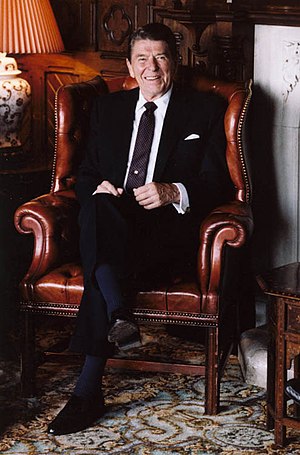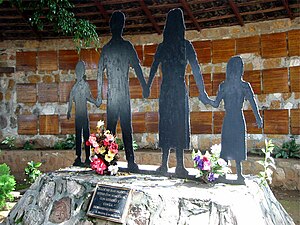U.S. Intervention within El Salvador's Civil War
In the late 20th century, the U.S. involvement within El Salvador's Civil War increased as the hostility and violence within the country increased. From 1980 up until 1992, the Salvadoran Civil War provided another example in which the United States was aware and threatened by the spread of Communism in Latin America. By the end of the war, the U.S. had contributed more than six billion dollars to the government of El Salvador.[1] Beginning during the presidency of Jimmy Carter, the conflict remained an integral foreign policy topic during the Reagan era.
U.S. foreign policy under Carter[edit]

Fearful that the far right or the radical left would gain complete control, President Jimmy Carter favored a moderate government that would provide stability for the people of El Salvador. Through this, Carter hoped to alleviate the human rights violations committed on behalf of the military regime at the time before the start of the civil war. The fear of communism continued to build within the American public sphere, which changed Carter's outlook on foreign policy toward El Salvador during the last years of his administration.
Not wanting a repeat of the success of the Communist Cuban Revolution and receiving public backlash for not being harsher in his treatment of controlling Communist sentiments in Latin American, President Carter began to support the Christian Democrats, the junta that was controlling the El Salvador government follow the coup against the previous military regime. In supporting the Christian Democrats, Carter hoped that with the help of military aid that the government of El Salvador, along with that of the United States, would defeat the leftist rebels, known as the Farabundo Martí National Liberation Front, who believed that human rights violations would only increase under the new regime.
By supporting the Civil War, Carter hoped to lessen the support and influence that Cuba and the Soviet Union were providing to the FMLN. In campaigning against Ronald Reagan in 1980, Carter transitioned his foreign policy views in El Salvador from one that was human rights-centered to one that was influenced by the mounting pressure being faced by critics who did not believe that he was taking an aggressive enough stance against the spread of Communism in Latin America.[2] However, Carter's involvement in Latin American issues were not popular with the general public, and helped secure his opponent's win, Ronald Reagan, in the following presidential election.
The Reagan era[edit]
President Ronald Reagan was further bothered by the threat of Communism permeating throughout El Salvador, which resulted in increased military support for the Christian Democrats. He believed that the only way to take a stance against the spread of Communism was through military actions in nations where its influence was evident. In 1981, Reagan increased economic aid to El Salvador by 523 million dollars, compared to the 184 million dollars sent the previous year in 1980, signaling a shift to Congressional support in the U.S. involvement within the conflict.

By training units of the Salvadoran military, the United States hoped to control counterinsurgency activity in order to control the opposition.[1] In December 1981, Lieutenant Colonel Domingo Monterrosa Barrios, who was advised by the U.S. Army Special Forces, of the Atlacatl Battion murdered around 500 men, women and children in the town of El Mozote, that later became known as the El Mozote massacre.[3] While FMLN guerrillas and reports repeatedly reported on the massacre, the White House failed to acknowledge that any such event had occurred.
The unrest in El Salvador contributed to polarizing beliefs between those who viewed the American involvement as critical for containing Communism, and those who believed that the intervention was creating more harm than good. Compared to the views held by President Carter towards El Salvador, Reagan's policies differed in several distinct ways in that it was globally-focused, refused to cooperate with the leftist opposition, increased and heavily enforced military influence, and lessened the human rights focus that previously defined the Carter administration.[2] During his administration, Reagan supplied El Salvador with 2.6 billion U.S. dollars.

Views and legacy[edit]
Today, many people view American involvement in El Salvador's civil war in a negative light, with the BBC noting that "many would say it takes a serious re-writing of history to portray El Salvador as a US success story".[4] The Atlantic also discusses the Salvadorian regime's human rights record, arguing that US intervention lead to terror for many Salvadorians due to its support of the notorious military.[5] This view has also been supported by researchers, who argue that the intervention was illegal and lacked regard for fundamental human freedoms.[6][7]
References[edit]
- ↑ 1.0 1.1 Crandall, Russell (2016). The Salvador Option. New York, NY: Cambridge University Press. ISBN 978-1-107-13459-1. Search this book on

- ↑ 2.0 2.1 Moreno, Dario (1990). U.S. Policy in Central America. Gainesville, FL: Florida International University Press. ISBN 0-8130-1005-5. Search this book on

- ↑ Binford, Leigh (2016). The El Mozote Massacre: Human Rights and Global Implication. The University of Arizona Press. ISBN 978-0-8165-3216-2. Search this book on

- ↑ Gibb, Tom (24 March 2002). "US role in Salvador's brutal war". BBC News. Retrieved 12 August 2017.
- ↑ Schwarz, Benjamin (December 1998). "Dirty Hands". The Atlantic. Washington, D.C. Retrieved 12 August 2017.
- ↑ McKinney, Cara E. (2014). "Twelve Years a Terror: U.S. Impact in the 12-Year Civil War in El Salvador". International ResearchScape Journal: An Undergraduate Student Journal. 2 (1). Retrieved 12 August 2017.
- ↑ Michaels, Peter S. (1 May 1987). "Lawless Intervention: United States Foreign Policy in El Salvador and Nicaragua". Boston College Third World Law Journal. 7 (2). Retrieved 12 August 2017.
This article "U.S. Intervention within El Salvador's Civil War" is from Wikipedia. The list of its authors can be seen in its historical. Articles copied from Draft Namespace on Wikipedia could be seen on the Draft Namespace of Wikipedia and not main one.
